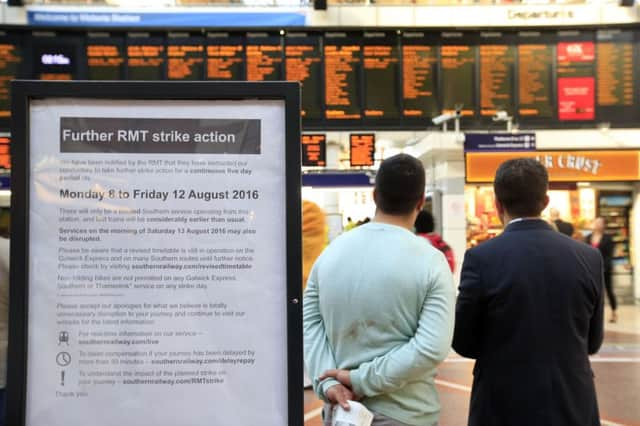David Behrens: Railway strike is not about safety, it's self-preservation


But logic has never been the railways’ strong suit.
The RMT has walked out today, as it has been doing continually in the south of England for the last 11 months, because it objects to the train companies redefining the roles of its guards.
Let’s be clear: the companies are not proposing to remove guards from trains, merely to redeploy them to serve a purpose more useful to the passengers.
Advertisement
Hide AdAdvertisement
Hide AdOne might have thought they were being let off lightly; after all, a train today does not really need a guard any more than it needs a fireman to stoke the boiler. When, for goodness sake, was the last time you saw one that still had a guard’s van?
Indeed, more than half the trains in Scotland operate without a guard at all, as does the London Underground. For practical purposes, they have been redundant since the last bus conductor left the depot.
But redundancy is not the issue here: no one is being threatened with the loss of a job. What we have instead is what in the 1970s we used to call a demarcation dispute; a simple question of who does what. In particular, who presses the button to open and close the doors.
That is not a difficult task. It’s more or less what you and I do every time we step into a lift.
Advertisement
Hide AdAdvertisement
Hide AdHistorically, on services in the North, it has been the guard’s job to do it. That’s why, usually when it’s raining, we all have to wait on the platform, while said guard squeezes along the aisle to get to the vestibule.
How much quicker it would be if the driver opened the doors from the cab, and closed them again when the passengers had boarded. All it would take is a mirror.
That, at any rate, is the Government’s view, and it has made it a condition of the new Northern Rail franchise, which began last year, that at least half its services eventually work in this way. The guards, so the argument goes, would then be freed up to sell tickets and perform other, as yet undefined, services to passengers.
The union does not like this for two reasons. Firstly, its members would no longer be able to earn money for old rope by skulking off to the driver’s cab when it suits them, emerging only to press the door button. More significantly, though, they would not be essential to the operation of the train. Consequently, they would not wield industrial clout. The service could be run with or without them.
Advertisement
Hide AdAdvertisement
Hide AdThat, of course, is what the RMT is really about here: not, as they would like you to believe, passenger safety, but simple, self-serving, institutional self-preservation.
They have left it a little late.
You need only look to the latest railway satisfaction ratings to see the extent to which trust has broken down between passengers and staff, not least in their ability, and willingness, to communicate information.
It’s not just the managers who are at fault, though heaven knows, responsibility hangs heavily on their shoulders; no, distrust runs right through the industry, and at every level.
It’s not hard to see why. Too many of the staff have as much idea of how to interact with the public as the Duke of Edinburgh.
Advertisement
Hide AdAdvertisement
Hide AdTheir present role, of taking fares when the machines on the platforms are broken or the queues at the ticket booths too long, appears almost discretionary: whether you get torn off a strip literally or figuratively depends on how much of a Jobsworth the guard on your particular train is being.
In the face of all this, the RMT ought to be mounting a charm offensive. Instead, it is retreating to the only language it knows: that of the scab and the strike ballot, as it seeks to preserve practices of the 19th, let alone the 20th, century in the face of modernising influences with which every other industry has had to deal for the last two generations.
The fact that this is happening in 2017, not 1987, speaks volumes about the way that British Rail in its death throes and the ineffectual private companies that followed in its wake have shied away from facing down the shop stewards.
Here is the central irony. By taking action which is, as the Transport Secretary Chris Grayling puts it, “palpable nonsense”, the RMT’s members are further corroding their relationship with passengers who, under the terms of their new job descriptions, they will have to be nicer to.
Advertisement
Hide AdAdvertisement
Hide AdJust when it seemed that their stock with the travelling public could not get any lower, today’s two-fingered salute re-sets the bar.
David Behrens is digital editor of The Yorkshire Post and a long-suffering commuter on the Wharfedale Line.